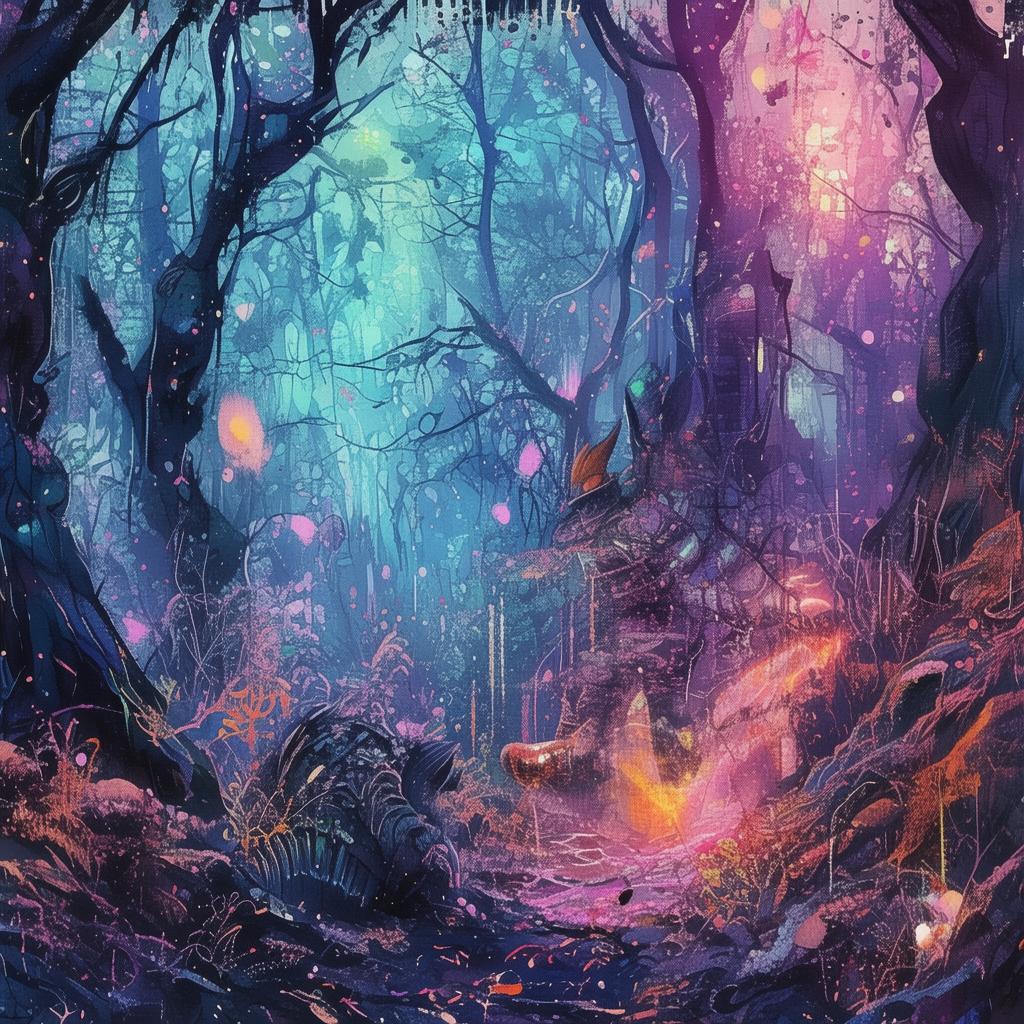The Pooch Poet's Enlightenment: The Quest for the Philosophical Stone
In the quaint village of Whiskerwood, nestled between rolling hills and whispering forests, there lived a dog named Pippin. Pippin was no ordinary canine; he had a gift for poetry that enchanted the villagers. His verses, which often spoke of the mysteries of the world, were whispered in hushed tones as if they held the secrets of the universe.
One crisp autumn morning, as the leaves danced in the wind, Pippin discovered a peculiar stone while on a walk with his human companion, Eliza. The stone was unlike any he had seen before, pulsating with an ethereal glow that seemed to beckon him. Intrigued, Pippin's nose twitched as he sniffed the stone, and suddenly, a vision filled his mind—a vision of a grand quest, a quest for the Philosophical Stone.
"Eliza," Pippin barked, his eyes wide with a newfound purpose, "I must go on a quest!"
Eliza, taken aback by Pippin's declaration, replied, "A quest, Pippin? But what kind of quest?"
"To find the Philosophical Stone," Pippin replied, his voice filled with determination. "I believe it holds the key to enlightenment."
With that, Pippin set off on his quest, his tail wagging with excitement. His first stop was the ancient library of Eldergrove, where the wisdom of ages was said to be stored. There, he met a wise old owl named Orin, who listened to Pippin's tale with a knowing gaze.
"Many have sought the Philosophical Stone," Orin hooted, "but few have succeeded. It is a quest that requires more than mere determination."
Pippin nodded, his eyes gleaming with curiosity. "What then, Orin?"
"Philosophy," Orin replied. "The quest for the Philosophical Stone is a quest for understanding the nature of existence, the essence of truth, and the purpose of life."
Pippin's ears perked up. "And how do I achieve this?"
"Through the study of philosophy," Orin said, "and the practice of deep reflection."
With Orin's guidance, Pippin delved into the works of ancient philosophers, their words like a beacon in the dark. He read of Socrates, who sought the truth through relentless questioning; of Plato, who explored the nature of reality through his allegory of the cave; and of Aristotle, who sought to understand the world through empirical observation.
As Pippin absorbed the wisdom of these great minds, he began to understand that the quest for the Philosophical Stone was not about finding a physical object, but about finding the answers within himself. He learned about the Socratic method, which encouraged him to question everything, even his own assumptions.
One day, as Pippin pondered the nature of reality, he realized that the world around him was a tapestry of interconnectedness. He thought of the trees, the rivers, the sky, and how they all played a part in the grand dance of existence. This realization brought him a profound sense of peace and understanding.
Pippin's journey continued, taking him to the heights of snowy mountains and the depths of the ocean. Each place he visited, he sought to understand the essence of the world around him. He met with mystics, scientists, and artists, each sharing their unique perspectives on the nature of existence.
As the quest progressed, Pippin's poetry transformed. His verses no longer spoke of the mysteries of the world, but of the mysteries within. He wrote of love, of loss, of joy, and of sorrow, understanding that these emotions were the very essence of life.
Finally, after many trials and tribulations, Pippin returned to Whiskerwood. He returned not with the Philosophical Stone, but with the enlightenment that had been his true quest. He shared his experiences with the villagers, and they listened in awe as he spoke of the interconnectedness of all things.

Eliza, who had followed Pippin on his journey, embraced him tightly. "You have found what you were searching for, Pippin," she said, her eyes filled with tears. "You have found yourself."
From that day on, Pippin's poetry was revered as a beacon of wisdom. His verses, filled with the insights gained from his quest, became a source of inspiration for all who heard them. And so, the legend of the Pooch Poet spread far and wide, a testament to the power of enlightenment and the quest for understanding.
In the end, Pippin realized that the Philosophical Stone was not a physical object, but a state of being—a state of deep understanding and connection with the world. And with that understanding, he found true peace and fulfillment.
✨ Original Statement ✨
All articles published on this website (including but not limited to text, images, videos, and other content) are original or authorized for reposting and are protected by relevant laws. Without the explicit written permission of this website, no individual or organization may copy, modify, repost, or use the content for commercial purposes.
If you need to quote or cooperate, please contact this site for authorization. We reserve the right to pursue legal responsibility for any unauthorized use.
Hereby declared.









